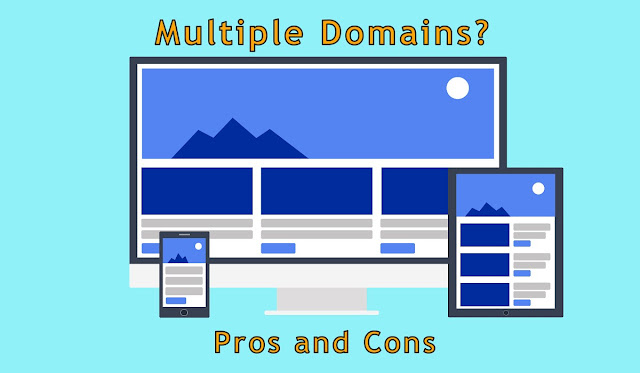Taking a narrow view that only considers search engine optimization (SEO), the short answer is multiple domains can hurt your page ranking. There is no benefit to having several keyword-rich domains pointing to your website. SEO is done on a single domain name and incorporates many things such as site popularity, the amount and type of content on the site, keywords in meta and title fields, and paying for a spot in the search engine database.
However, there are some benefits when taking into account the functionality of the site and how it supports your goals. It’s important to consider the role of your website (or sites) when choosing to use more than one URL. If your website serves a simple purpose, such as a portfolio of work samples, using multiple pages on the same site will likely be adequate. If the business model is a bit complicated, then it’s worth exploring how to leverage several sites. But a few words of caution at the start:
More work – Each site will require unique content, regular updates, and SEO attention, so this will mean more time.
More cost – All of that extra work will cost staff time, tech support, and outside vendors will also require two paychecks. There can be some economies of scale for hosting and other services, but that needs to be weighed against the value added to the goals for the sites.
Organization – More than just scheduling regular maintenance and content updates, you’ll have to make sure your marketing messages are consistent across all platforms, including the websites.
The Pros
So when does using multiple sites make sense?
A Single Business with Diverse Audiences
Any marketing or sales professional will tell you that one-size does not fit all when it comes to communicating with different people. Each group has its own set of needs and expectations about what products or services will do for them. When a diversity of messages are required, separate sites makes it possible to tailor content as well as approach an individual group.
For example, a company that supports schools with a diversity of resources might have product lines specifically for K-12 teachers, high school teachers, and college professors. Each audience has a distinctly different professional style and educational criteria to meet. A separate site for each group will avoid the need for the visitor to sort through any irrelevant information to find “their” material. This audience-specific approach can also be helpful for cultivating links with other sites, which does help search engine rankings.
Niche Website for Showcasing Specialization
Niche websites can be much more appealing over a large, generic site. Larger sites run the risk of having too much overlap with a competing site, which diminishes the likelihood of adding links. Niche sites – which don’t necessarily have to be small – allow for the kind of specialization that can be helpful to complement the information (or services) of other sites. This can support the development of deep, topic-specific content making your site a valuable (and linkable) resource. From a marketing and sales standpoint, these niche sites can support niche products and services
High Turnover
In some industries, name changes are common. A financial service firm or law firm might change partners – adding a new name or removing the name of a retiree. If an affiliation exists with a parent company, such as a real estate broker with multiple state or regional offices, a rebranding effort might dictate a change. In these and other cases, multiple domain names can be helpful to leverage an established identity or geographic presence.
Multiple Countries, Multiple Languages
If you’re doing business in multiple countries, it might be worth having separate sites for each geographic location. Localizing the colors, images, and content to match the social and cultural norms will make the sites more user-friendly. And matching local preferences and habits can make the URL easier to find.
The Cons
The issues related to maintain multiple sites are as much practical as they are SEO related.
Ranking – There is zero benefit to having multiple sites. And there could be some negatives, such as garnering bad links to phishing sites, which require significant technical troubleshooting.
Can’t find you – People tend to look up a company by name, so multiple domain names can make it difficult (not to mention confusing) for a prospect or customer to find what they need.
Loss of authority – Longevity is necessary for a domain name; changing it hurts the site’s credibility.
Expenses – The time and money required for building and maintenance (including fixing problems) increase with the number of sites you have to maintain.
Diluted identity – Depending on your brand, splitting off products and services on different sites could undermine the power and market influence of your company.
Merging issues – If you decide later to move to a single website, the migration needs to be done correctly (which means more expense).
A single website can support multiple product lines and services as long as the site is easy to navigate. So it’s important to keep that primary motivation in mind, not the ease or low cost of design maintenance.
Each website owner is going to have a unique combination of goals and priorities. Those, not a fabulous web hosting package, need to guide this kind of domain decision.










0 comments:
Post a Comment